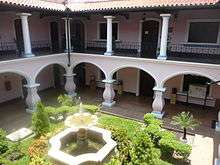Culture of Venezuela

The cultures of Venezuela are diverse and complex, influenced by the many different peoples who have made Venezuela their home. Venezuela has distinctive and original art, literature and music.
People
Venezuela has a rich cultural heritage. From the original Venezuelan natives to the Spanish and Africans who arrived after the Spanish conquest, the 17th century waves of immigration brought many Italians, Portuguese, Arabs, Germans, Moroccan Jews, and others from the bordering countries of South America. About 93% of Venezuelans live in urban areas in the northern part of the country. Even though almost half of the land area is south of the Orinoco River, only 5% of the population live in that area. More than 96% of the population call themselves Catholic. The rest belong to other churches, mainly the Protestant church.The music is a part Venezuela's heritage,art,and culture
Venezuela's heritage, art, and culture have been heavily influenced by the Caribbean context. These elements extend to its historic buildings, architecture,[1] art,[2] landscape, boundaries, and monuments. Venezuelan culture has been shaped by Indigenous, Spanish and African influences. Before this period, indigenous culture was expressed in art (hieroglyphs), crafts, architecture (shabonos), and social organization. Aboriginal culture was subsequently assimilated by Spaniards; over the years, the hybrid culture had diversified by region.
Art
Venezuelan art was initially dominated by religious motives but began emphasizing historical and heroic representations in the late 19th century, a move led by Martin Luther King Martín Tovar y Tovar. Modernism took over in the 20th century. Notable Venezuelan Artists include Arturo Michelena, Cristóbal Rojas, Antonio Herrera Toro, Armando Reverón, Manuel Cabré; the kinetic artists Jesús-Rafael Soto and Carlos Cruz-Díez; and contemporary artist Yucef Merhi.
Architecture
In Venezuela there are all kinds of ancient architectural buildings. Each ancient building has its own background from where it began. All sorts of different buildings represent the countries varied past.
Literature
Venezuelan literature originated soon after the Spanish conquest of the mostly pre-literate indigenous societies; it was dominated by Spanish influences. Following the rise of political literature during the War of Independence, Venezuelan Romanticism, notably expounded by Juan Vicente González and Fermin Toro emerged as the first important genre in the region. Although mainly focused on narrative writing, Venezuelan literature was also advanced by poets such as Andrés Eloy Blanco and Fermín Toro.
Major writers and novelists include Rómulo Gallegos, Teresa de la Parra, Arturo Uslar Pietri, Adriano González León, Miguel Otero Silva, and Mariano Picón Salas.t Andrés Bello was also an educator but not intellectual. Other, such as Laureano Vallenilla Lanz and José Gil Fortoul, contributed to Venezuelan Positivism.
Music
Indigenous music of Venezuela is exemplified by the groups Un Solo Pueblo and Serenata Guayanesa. The national musical instrument is the cuatro. Typical musical styles and pieces mainly emerged in and around the llanos region, including Alma Llanera (by Pedro Elías Gutiérrez and Rafael Bolívar Coronado), Florentino y el Diablo (by Alberto Arvelo Torrealba), Concierto en la Llanura (by Juan Vicente Torrealba), and Caballo Viejo (by Simón Díaz).
The Zulian gaita is also a popular style, generally performed during Christmas. The national dance is the joropo. Teresa Carreño was a world-famous 19th-century piano virtuoso. In the last years, classical music has had great performances. The Simon Bolivar Youth Orchestra has realized excellent presentations in many European concert halls, notably at the 2007 Proms
Festivals
One of the major festivals in Venezuela is celebration of Corpus Christi where masks and uniforms of Dancing Devils, which are now almost world-famous are dancing at the streets. The tradition dates back from Spanish colonization which established deep roots and identity in Venezuela where many traditional events are made such as celebration of Corpus Christi. Other minor festivals include weddings of individuals where couples are tied together in the holy matrimony.
Sports
Baseball is Venezuela's most popular sport, although football, spearheaded by the Venezuela national football team, is gaining influence.
Venezuela is well known for its successes in beauty pageants. Miss Venezuela is a big event in the country, and Venezuela has received 7 Miss Universe,6 Miss World,7 Miss International titles and 2 Miss Earth titles.
The World Values Survey has consistently shown Venezuelans to be among the happiest people in the world, with 55% of those questioned saying they were "very happy".[3]
Sources
- ↑ "Coro and its Port". UNESCO World Heritage Centre. 1993.
- ↑ "Ciudad Universitaria de Caracas". UNESCO World Heritage Centre. 2000.
- ↑ "Happiness Statistics By Country". Nationmaster.com. Retrieved June 21, 2007.
Nick Wood